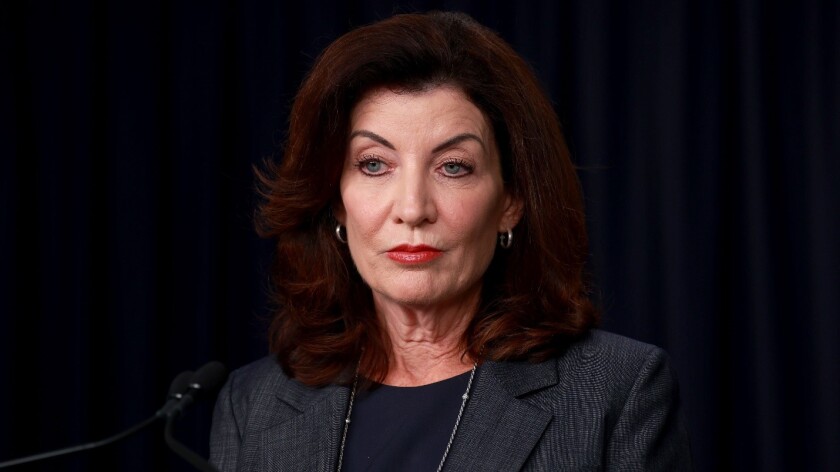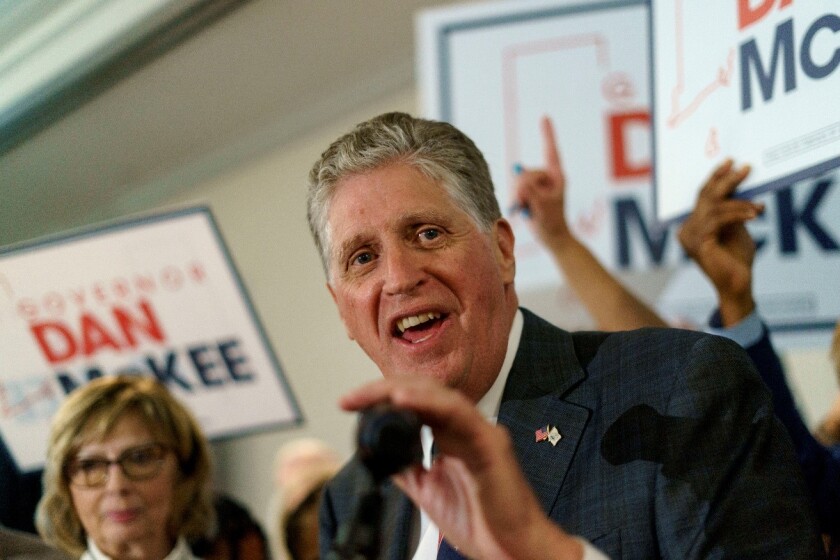
The Growing Conspiracy Against Donald Trump: For much of the year, Republicans swatted aside Democratic complaints against former President Trump, noting that he wasn’t on the ballot this year. They seem to have changed their minds.
Since Tuesday, there’s been a loud chorus of conservatives blaming Trump for the GOP’s surprisingly poor midterm performance. It’s not just the usual suspects, such as Maryland Gov. Larry Hogan or Illinois Congressman Adam Kinzinger. The entire Murdoch media empire seems to have turned against Trump – including Fox News, The Wall Street Journal and the New York Post, which put an image of “Trumpty Dumpty” on its cover. In fact, there seems to be a Trump-style contest to dismiss him with derisive nicknames, such as “Toxic Trump” and “the Trump Titanic.” “The biggest loser” has also been popular.
Trump not only turned himself back into an issue by barnstorming around the country during the closing days of the campaign, but promoted numerous candidates in primaries who went on to lose or badly underperform the rest of the GOP ticket in states including Georgia, Michigan, New Hampshire and Ohio. “I think a huge factor in all of this was the disastrous role of Donald Trump in the whole process,” said outgoing Pennsylvania GOP Sen. Pat Toomey, whose seat was lost to the party by Trump-anointed Dr. Mehmet Oz.
Commentators were quick to point out that Republican governors who’ve refused to bend the knee toward Trump performed quite well, including Brian Kemp of Georgia, Mike DeWine of Ohio and, especially, Florida’s Ron DeSantis, who won his reelection bid by nearly 20 points. Even before the midterms, some heavy-hitting GOP donors were signaling their hope not only that DeSantis will run for president but that he’d be the next presidential nominee instead of Trump. “You can see why the money types would want someone who could push all of Trump’s buttons but not have his baggage, and they think DeSantis is that guy,” says Geoffrey Kabaservice, vice president of political studies at the Niskanen Center, a nonpartisan think tank.
DeSantis has been competitive with Trump in recent polls of some early primary states. In the immediate wake of the election, his price on the online betting market PredictIt as the 2024 GOP presidential nominee shot up higher than Trump’s. “The narrative out of 2022 does seem to be a repudiation of Trump, and a lot of Republicans seem to be looking elsewhere,” says Hans Noel, a political scientist at Georgetown University. “From the perspective of the Republican Party as a party, and from the conservative ideological movement, it makes a lot of sense to move on from Trump.”
Noel cautions that wouldn’t mean moving away from Trumpism. The party as a whole has aligned itself with Trump’s populist positions on issues such as immigration and trade, not to mention its widespread embrace of his denialism about the results of the 2020 presidential election. “The party leadership may not have wanted a Trump-like candidate in 2016, but in 2024 they probably will, even if they don’t want Trump himself,” Noel says.
Trump allies are now hoping he’ll hold off on announcing his next presidential run, currently expected to happen next week, until at least after the Senate runoff in Georgia. Will he listen? He has long prided himself on doing things in his own, unconventional way. Trump has shown no interest in removing himself from the national stage and appears eager to take on, or if possible take down, DeSantis.
There have always been a number of Republicans who have been uncomfortable or even harshly critical of Trump. Their careers have, for the most part, reached premature ends. Of the 10 House Republicans who voted to impeach Trump last year for his role in the Jan. 6 assault on Congress, only one, Dan Newhouse of Washington, has won reelection to serve next year. (The California race involving one other, David Valadao, has yet to be called.)
But Trump’s critics in the past have focused on his personal failings. Now, more members of the GOP believe that he’s a political liability. He engenders tremendous loyalty among some voters, but puts too many others off. Under Trump, Republicans lost control of the presidency and Congress and he may have cost them control of the Senate again this week. The business of political parties ultimately is to win elections and, in DeSantis, many Republicans believe they have at last found a viable alternative to Trump.
On the other hand, many Republicans looked ready to turn their backs on Trump following the Jan. 6 attack, but came around again. Trump’s continuing influence among Republican voters was amply demonstrated by his outsized influence in GOP primaries, even if his handpicked candidates ultimately fared poorly. “We’ve seen this before,” Noel says. “There always been a lot of Republicans who would like to move on from Trump’s influence, but most of them are either happy to have the positives he brings, or at least are afraid of alienating him.”
According to normal political calculations, Trump should have been sidelined following his 7-million vote loss in 2020. Yet he remains the central figure in the party.

How Florida Turned Deep Red: Over the course of this century, Florida has been a key swing state. Readers with long memories will recall how the 2000 presidential election turned on the long Florida recount, which Republican George W. Bush ultimately won by 537 votes. Its switch from Democrat Barack Obama to Trump in 2016 was key to the latter’s success.
Well, those days are over. Florida was just about the only state that seemed to get the memo that this was supposed to be a red-wave election. DeSantis initially won election in 2018 by less than half a percentage point. On Tuesday, he not only won easily but carried Democratic strongholds such as heavily Hispanic Miami-Dade County. Republican U.S. Sen. Marco Rubio performed nearly as well, while the GOP won supermajorities in both the state House and Senate. Since DeSantis took office, Republican registration has grown in the state by more than 540,000 voters, while the number of registered Democrats has declined.
How has Florida turned from being a purple state to blood red? “Gov. DeSantis is the short answer,” says Aubrey Jewett, a political scientist at the University of Central Florida. “The policies that he has pushed and the way that he has framed issues — and his ability to generate media attention — has been terrific politically.”
DeSantis initially governed as a conservative but reasonably bipartisan figure, finding common cause with Democrats occasionally on issues such as the environment and marijuana. He’s taken a much harder-edged, partisan approach as his first term has gone on, particularly since the pandemic. DeSantis has mastered the art of building himself up by tearing enemies down, from Disney and teachers’ unions to “the “woke” left. He turned his opposition to pandemic shutdowns and mask and vaccine mandates into a winning political slogan: “the free state of Florida.”
“His style of leadership attracts Republicans, certainly,” Jewett says, “but it seems to appeal to a wider base. He’s going people thinking, ‘I like him and the way he talks and leads. He seems so sure of himself, I must be a Republican, too.’”
Obviously, there are Floridians who hate DeSantis. National Democrats stand ready to turn him into a political piñata. But his instinct for finding not just salient issues but resonant ways of framing them has catapulted him in the collective GOP imagination past other governors with obvious national ambitions, such as Greg Abbott of Texas and Kristi Noem of South Dakota.
Which gets us back to DeSantis’ coming confrontation with Trump. “DeSantis may be the next evolution of someone who can marry what you like about Trump, but also recover some people that went away from the party during Trump,” GOP consultant Scott Jennings said on CNN on Tuesday.
Odds and Ends: It was widely noted this week that Democrats’ victory in the Michigan Senate gives the party not only control of the chamber but the state as a whole for the first time in 40 years. That doesn’t convey the full sense of how rare this is.
The previous time Michigan Democrats held both the governor’s office and the legislature was way back in the 1930s, according to Zach Gorchow, executive editor of Gongwer, a news service in the state. Democrats held power for two separate two-year periods, following the 1932 and 1936 elections. Prior to that, you have to go back to 1891. And … that’s it.
… Tom Miller and Michael Fitzgerald are both record-holders. The two Iowa Democrats have served, respectively, as state attorney general and treasurer longer than anyone else in any state — 40 years apiece. Their long tenures came to an end on Tuesday. State Auditor Rob Sand is holding onto a miniscule lead. If it lasts, he’ll be the last Iowa Democrat holding statewide office.

… Ammon Bundy is an anti-government militant who participated in armed standoffs against federal authorities in 2014 and 2016 and was arrested repeatedly at the Idaho Statehouse while protesting COVID-19 restrictions. He ran as an independent for governor this year and received more than 100,000 votes, or 17 percent — not far behind Democrat Stephen Heidt. (GOP Gov. Brad Little won a second term.)
… North Dakota voters approved a ballot initiative creating term limits for both the governor and legislators — a maximum of eight years in the governorship, state House and state Senate. North Dakota becomes the 16th state with legislative term limits and the first to enact them since Nebraska back in 2000, according to the National Conference of State Legislatures.
… Last month, I wrote an article exploring the pros and cons of electing local officials on a partisan basis. One obvious danger is that someone with the right party affiliation could win despite having the wrong credentials. That just happened in Haywood County, N.C. In every other county in North Carolina, the tax collector is appointed, not elected. In Haywood, the job is decided through partisan elections. Greg West had achieved a higher rate of tax collection than his predecessors but, well, he’s a Democrat in a red county. Voters just replaced him with Sebastian Cothran, a Republican and a 21-year-old college senior. Since he’s still a student, maybe he can learn on the job.
A final note: I had the chance to talk with NPR's Elissa Nadworny about legislative races on All Things Considered last Wednesday. You can listen to that conversation, or even read the transcript, here.
Previous Editions
-
Gov. Kathy Hochul skips a step, another potential shocker in Oklahoma and Arizona's threats and intimidation.
-
Do cross-party endorsements signal a fracturing GOP? Plus, a Democrat may lose after half a century, how justices gain political advantage and not knowing when to say "when."
-
Why are so many candidates deciding they’re better off not debating? Meanwhile, GOP candidates struggle to raise funds, Republicans boost legislative candidates and Texas AG Paxton won’t be served.
-
This year's primary election season reached its conclusion in three Northeastern states on Tuesday and MAGA Republicans succeeded in New Hampshire. Meanwhile, state Supreme Court justices defend their own role and an intergovernmental feud heats up.












